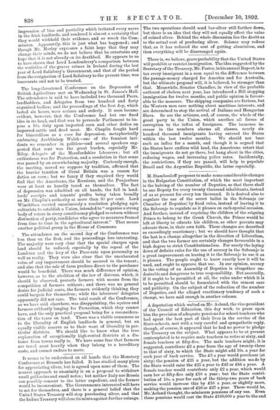A deputation which waited on Mr. Acland, the vice-president of
the Council of Education, this day week, to press upon him the provision of adequate pensions for school-teachers who had spent the best part of their lives in the service of the State-schools, met with a very careful and sympathetic reply, though, of course, it appeared that he had no power to pledge the Treasury on the subject. What appears to be at present contemplated is to require male teachers to retire at sixty, and female teachers at fifty-five. The male teachers might, it is suggested, contribute £3 a year from the age of twenty-three to that of sixty, to which the State might add 10s. a year for each year of back service. The £3 a year would purchase (at sixty) the pension of £25 a year, but the addition ma de by the State would raise the £25 a year to £43 or £44 a year. A female teacher would contribute only £2 a year, which would earn her at fifty-five only £10 a year; but the State contri- bution of 10s. a year for each of the thirty-two years of back service would increase this by £16 a year, or slightly more, making the pension one of £26 or £27 a year. These would be, litr:Aeland thought, the minimum pensions of any use. Even these pensions would cost the State £160,000 a year to the end of the century ; £280,000 a year from 1901 to 1910 ; £500,000 a year from 1911 to 1920; £700,000 a year from 1921 to 1930; and £500,000 a year from 1931 to 1940; and the total cost to the State for the next fifty or sixty years would be about £22,000,000. Mr. Acland did not make any disguise as to the difficulty there might be in getting the Treasury to commit itself to such an expenditure.







































 Previous page
Previous page